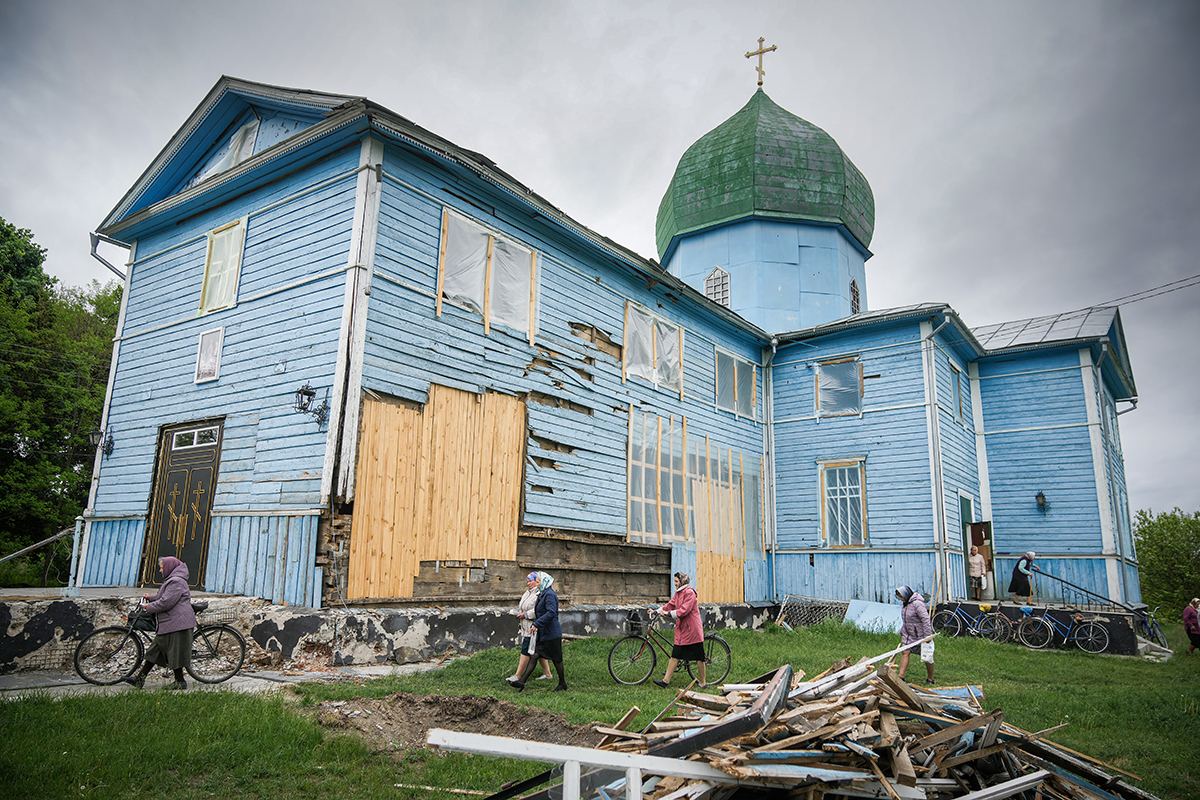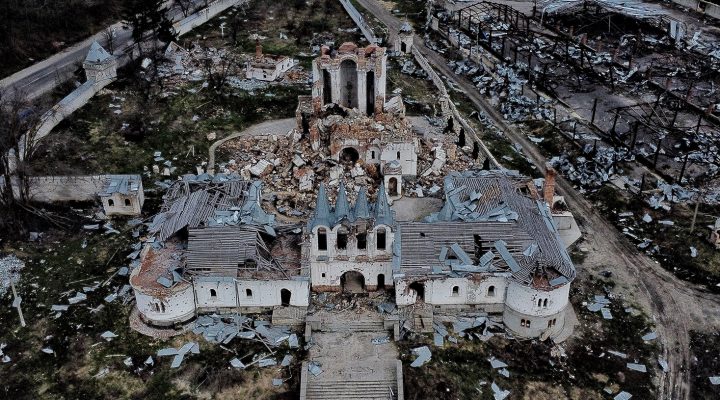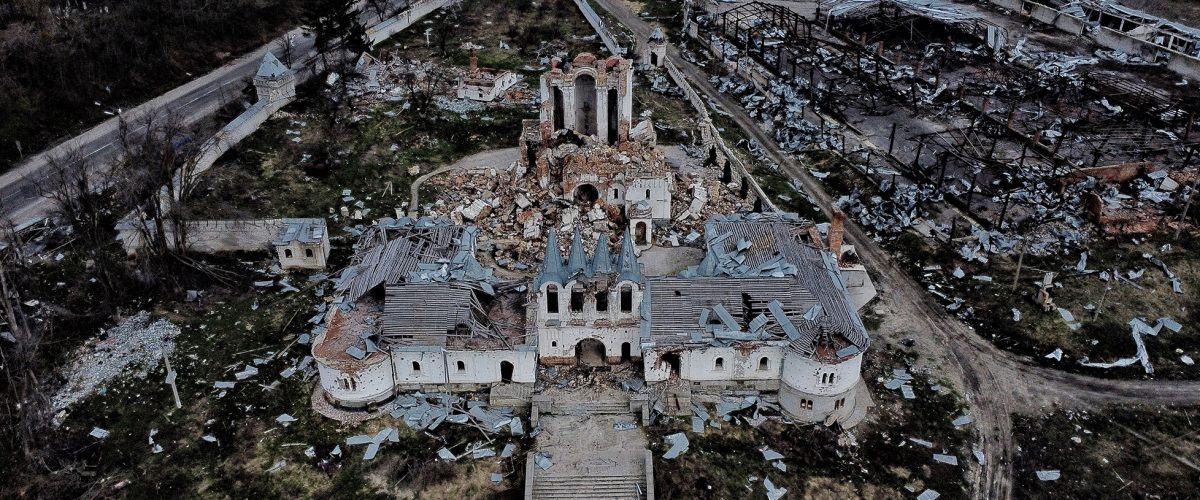The oppression of Ukrainian religious communities should be added to the war crimes charges already filed against Russian leaders by judges in the Hague, an official with the U.S. Commission on International Religious Freedom said May 1.
Brutal and ongoing attacks against faith groups and leaders in occupied Ukraine have been as terrible as they have been unsurprising given Russia’s ongoing oppression of religious minorities within its own borders, USCIRF Commissioner Stephen Schneck said.
He spoke during an online release of the commission’s new annual report on the state of global religious freedom.
“What we have noticed here at USCIRF is that much of that destruction and much of that violence has been aimed directly at religious institutions, at clergy, at cemeteries, at the holy sites of a variety of denominations,” he said. “And so, the situation is frankly about as horrible as can be imagined and … I would hope that the International Criminal Court would take these atrocities against religious institutions and religious people as seriously in their consideration of the charge of war crimes against the Russian Federation.”
Russian President Vladimir Putin and Russia’s commissioner of children were issued arrest warrants in March by the Hague for war crimes for illegally transporting children from Russian-occupied areas of Ukraine. But the focus of USCIRF and its 2023 annual report is on how the policies and actions of Russia and other repressive regimes pose a dire threat to global religious freedom.

Parishioners leave a Sunday church service in the bomb damaged Church of the Nativity of the Blessed Virgin in the village of Perehoma on the outskirts of Kyiv on May 22, 2022, in Kyiv, Ukraine. (Photo by Christopher Furlong/Getty Images)
USCIRF breaks those nations into two main categories, the more serious being Countries of Particular Concern, and those it suggests for a Special Watch List. Both designations are defined by the International Religious Freedom Act and are administered by the U.S. State Department which, along with the White House and Congress, are recipients of USCIRF reports.
The act, passed by Congress in 1998, defines CPCs as nations that engage in or allow “particularly severe” religious freedom violations, such as torture or inhumane or cruel punishment, including lengthy detentions without charges. Countries known for “severe” violations of religious freedom are recommended for the watch list.
The commission also recommends non-state actors as Entities of Particular Concern if they perpetrate severe violations of religious freedom.
The report “sounds the alarm regarding the deterioration of religious freedom conditions in a range of other countries. … This year, these countries include Sri Lanka, which USCIRF is recommending for placement on the State Department’s Special Watch List for the first time. USCIRF previously published country updates on Sri Lanka in 2021 and 2022 and found sufficient evidence of severe violations of religious freedom, such as discrimination against religious minorities in the form of targeted arrests using problematic legislation and appropriation of land and property.”
Cuba and Nicaragua are among those being recommended again for CPC status.
“In Cuba, religious freedom conditions in 2022 worsened considerably, with the government seeking total dominance over religious life in the country,” the report states. “Additionally, the regime in Nicaragua has sharply increased its persecution of the Catholic Church by imprisoning clergy, shuttering church-affiliated organizations and prohibiting Catholic rituals.”
The commission found Iran intensified its crackdown on religious freedom in 2022 and merits CPC status again this year.
“Iranian authorities’ systematic use of sexual and gender-based violence against them represents a purposeful weaponization of religious conceptions of purity, modesty and gender hierarchy in an effort to shame Iranians out of peacefully asserting their fundamental right to religious freedom,” the report states.
Iran has not discriminated in which religious groups and individuals it desires to oppress USCIRF added.
“Iranian security services also targeted religious minorities who have fled abroad as well as activists in other countries, including on U.S. soil.”
“Iran’s leadership continued to target members of the Baha’i, Christian, Gonabadi Sufi, Zoroastrian, Yarsani, Sunni Muslim, Shi’a Muslim, and nonreligious communities with harassment, arrests, egregiously long prison sentences, multiyear internal exiles or bans on participating in political and social activities,” it explains. “Iranian security services also targeted religious minorities who have fled abroad as well as activists in other countries, including on U.S. soil, who opposed mandatory headscarf laws and other religious freedom restrictions.”
Religious liberty conditions also continued a downward spiral in Burma in 2022, the report states, with the Buddhist-aligned junta severely persecuting disobedient Buddhists and members of minority faiths.
“The government violently targeted houses of worship belonging to religious minorities throughout the year, with evidence suggesting the State Administration Council is using the same tactics against these communities that its forces have deployed against Muslim-majority Rohingyas since 2017,” the report says. “From the time of the 2021 coup through December 2022, government forces damaged or destroyed at least nine Catholic churches … and severely affected at least 16 out of 38 Catholic parishes. Government forces have also burned villages of religious minorities and even members of the Buddhist majority, destroying homes and houses of worship and schools in the process.”
USCIRF also expressed concerns about deteriorating conditions for faith minorities in India, Nigeria and Vietnam.
“In 2022, religious freedom conditions in India continued to worsen. Throughout the year, the Indian government at the national, state, and local levels promoted and enforced religiously discriminatory policies, including laws targeting religious conversion, interfaith relationships, the wearing of hijabs, and cow slaughter, which negatively impact Muslims, Christians, Sikhs, Dalits, and Adivasis (indigenous peoples and scheduled tribes).”
The commission recommended CPC status for Nigeria because the government and local nonstate actors have committed religious freedom violations through violent acts and lengthy prison terms for those who violate blasphemy laws.
“In many of the country’s complex violent crises, armed actors targeted worshipers and religious leaders,” the report says. “Attacks targeted churches and mosques in Kaduna State, mosques in Zamfara and Katsina states, and several Christian leaders in other parts of the country. Tensions at the intersection of ethnicity, religion and geographic heritage yielded atrocities in several regions.”
“Tensions at the intersection of ethnicity, religion and geographic heritage yielded atrocities in several regions.”
Vietnam cracked down on Protestant, Catholic and Buddhist groups to the extent that it also earned a CPC recommendation from USCIRF.
“In 2022, religious freedom conditions in Vietnam worsened. Authorities intensified their control and persecution of religious groups — especially unregistered, independent communities, including Montagnard and Hmong Protestants, Cao Dai followers, Hoa Hao Buddhists, and Unified Buddhists, as well as other unrecognized movements such as Duong Van Minh and Falun Gong.”
Additionally, the report recommends Afghanistan, Syria, China, Eritrea, North Korea, Pakistan, Saudi Arabia, Tajikistan and Turkmenistan as Countries of Particular Concern.
Algeria, Azerbaijan, the Central African Republic, Egypt, Indonesia, Iraq, Kazakhstan, Malaysia, Sri Lanka, Turkey and Uzbekistan round out the nations recommended for the watch list.
But USCIRF noted its suggestions for violator designations and diplomatic actions are recommendations only — and often ignored by U.S. authorities.
“The State Department did not designate Afghanistan, India, Nigeria or Syria as CPCs in 2022 despite USCIRF’s recommendations to do so and its own reporting documenting the nature and extent of the religious freedom violations in those countries,” the report reminds. “USCIRF has recommended CPC status for Afghanistan since 2022, India since 2020, Nigeria since 2009, and Syria since 2014, and it issued a public statement criticizing the State Department’s omissions.”
Related articles:
USCIRF warns of dangerous use of blasphemy laws in Nigeria
80,000 Jews have fled Russia since Putin invaded Ukraine


